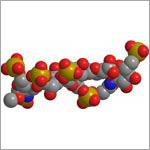
View larger image
The low molecular weight (LMW) form of the drug heparin is commonly used to prevent unwanted blood clots that can lead to heart attacks and strokes. It’s usually derived from pig intestines and normally cleared from the human body by the kidneys. In individuals with impaired kidney function, the drug can build up in the circulation and cause excessive bleeding. Impurities and the risk of contamination are also concerns with pig-derived heparin.
Now, Robert Linhardt of Rensselaer Polytechnic Institute and Jian Liu of the University of North Carolina at Chapel Hill have created a synthetic, tailor-made form of LMW heparin that offers several advantages over the animal-derived version, including alleviating the risk of contamination from natural sources. Studies in the test tube and in mice showed that the activity of this customized heparin molecule is easily reversible in cases of overdose or uncontrolled bleeding. And, since it is cleared from the body by the liver rather than the kidneys, this form of heparin would be safer for people with impaired kidney function. Additional research, including testing in humans, will be needed before this new version of LMW heparin can be considered for medical use.
This work also was funded by NIH’s National Heart, Lung, and Blood Institute.
Learn more:
Rensselaer Polytechnic Institute News Release ![]()
University of North Carolina at Chapel Hill News Release
Linhardt Labs
Liu Lab


This is good news. We still have a problem. The remanufacturer’s of heparin have a need to be in compliance. If they add another additive/s, this also is potentially dangerous to the person receiving the drug. Instead of life saving, it could become fatal! I know, it almost killed me when it was supposed to be saving my life! The NDC # is on my record so we never make the mistake of giving me that particular one. People with multiple allergies and multiple medical problems, don’t need a ‘code blue’! Let’s really take the time and test these drugs before giving them permission to sell them, please!?
I realize I may be one of those patients who are exceptions, however I am not alone! There are many people like me! Be aware and cautious, alert and screen every aspect before we say, ‘this is acceptable’! You may very well save lives with due diligence! Genetics, may be of great importance and assistance in your studies. I can only hope it becomes more advanced with better screening and scrutiny.